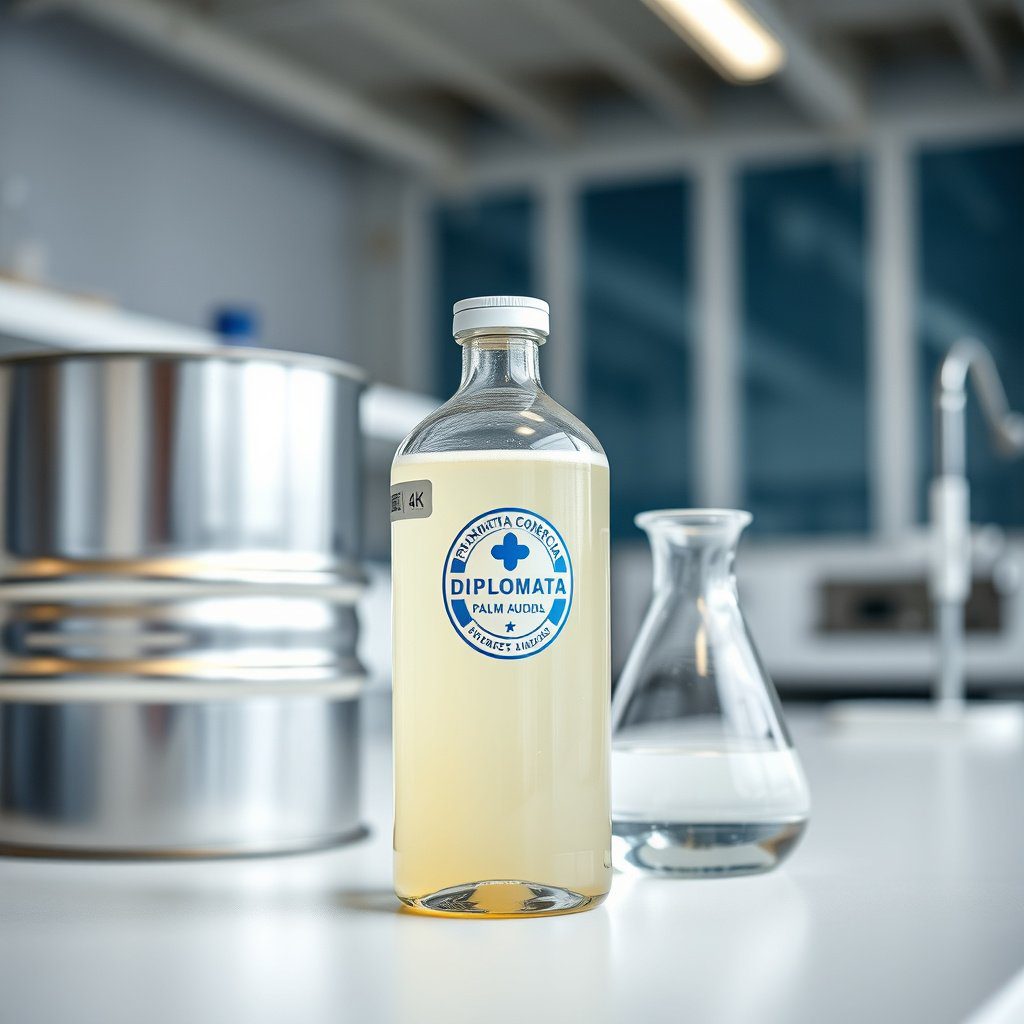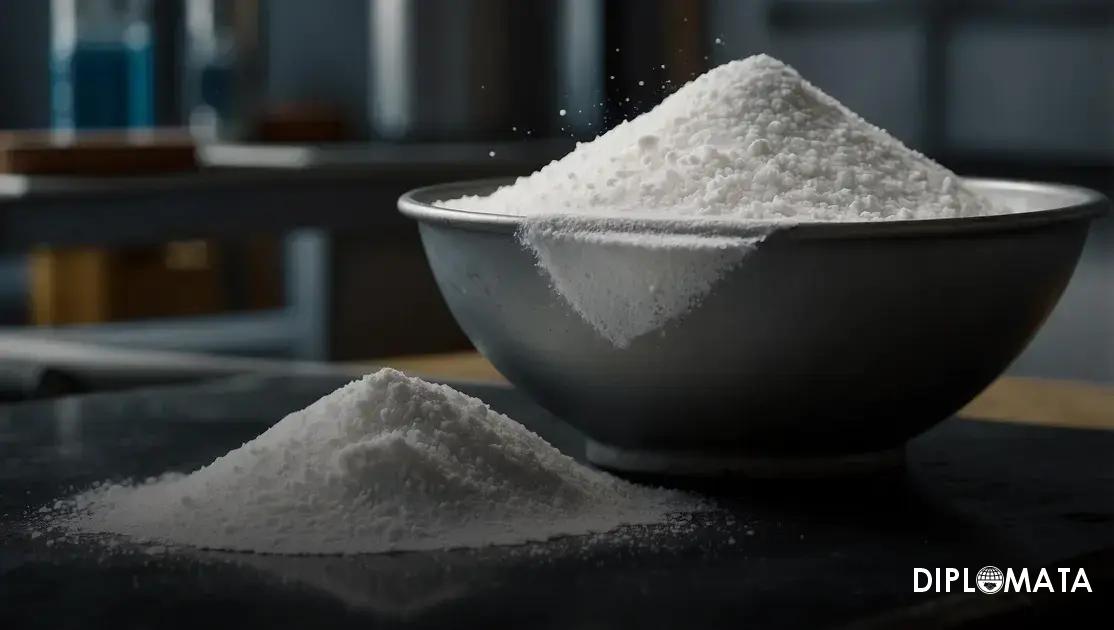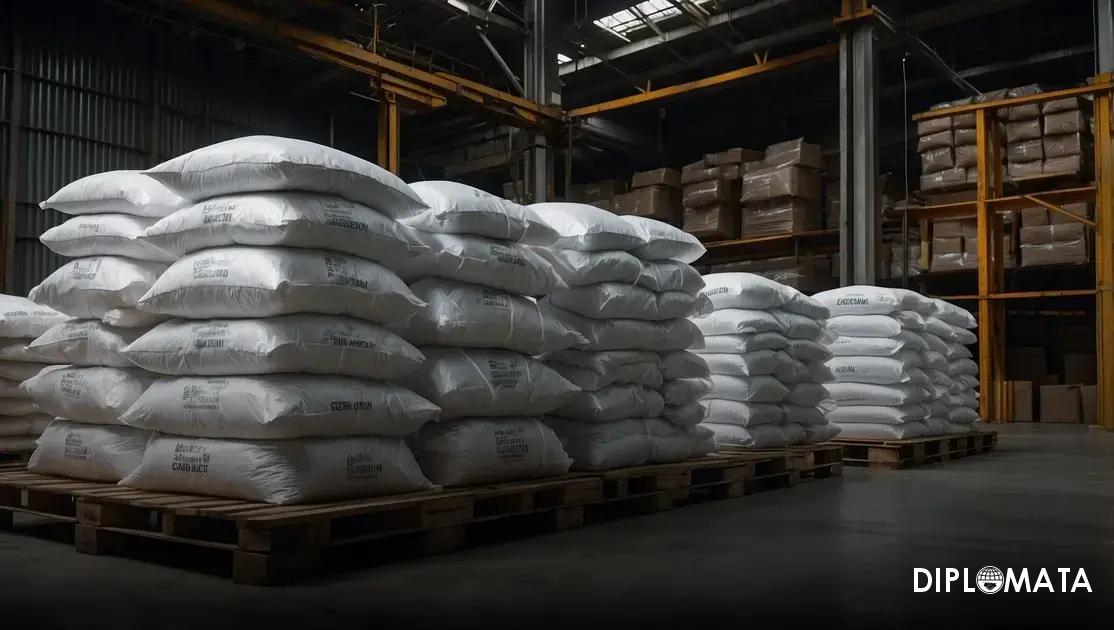Choosing a reliable palm fatty acids supplier is a strategic decision that directly influences product performance, regulatory alignment, and ongoing supply continuity.
For companies seeking a Palm Fatty Acids Supplier, the selection process should balance technical capability with global reliability and long-term partnership potential.
Over two decades in the chemical and oleochemical space, Diplomata Commercial has built a proven global footprint, serving industries from HPPC and pharma to animal nutrition.
Our teams coordinate across sourcing, quality, and logistics to deliver consistency, traceability, and value.
In this guide, you’ll find practical criteria, questions to ask, and steps to vet suppliers so your team can move forward with confidence.
We’ll illustrate how mature, globally integrated procurement strategies reduce risk and shorten sourcing cycles, all while preserving formulation integrity.
The goal is to help you secure a dependable palm-derived feedstock tailored to your process, with the support of a partner that combines technical depth with hands-on execution.
This is about turning supplier selection into a competitive advantage for your business.
What follows is a structured, field-tested approach drawn from real-world experience across industries that rely on oleochemicals and allied products.
You’ll see how rigorous evaluation translates into tangible outcomes: stable pricing, assured quality, and reliable delivery schedules.
Across our portfolio—measured through years of performance rather than promises—we’ve demonstrated that a trusted supplier can unlock efficiency in your supply chain and bolster your product quality.
This is the lens through which we’ll explore criteria, evidence, and practical steps, all aimed at helping you make an informed decision and foster a durable partnership.
Key Criteria for Selecting a Palm-Derived Fatty Acids Provider
Technical Capabilities and Product Portfolio
One of the first questions to answer is whether a potential partner can meet your specific formulation needs.
Look for a supplier with broad technical capabilities across oleochemicals, animal and vegetal fats, and related processing inputs.
A robust portfolio signals the ability to support multiple grades, from commodity to USP-quality specifications. Strong technical support and access to laboratory services enable rapid troubleshooting and product development collaboration.
In practice, a mature supplier demonstrates a track record of delivering consistent quality across batches and a clear process for handling deviations.
Beyond the core fatty acids, consider the breadth of related materials that can streamline procurement and reduce supplier fragmentation.
For example, a supplier with experience in glycerin (both crude and USP), propylene glycol USP, mineral oils USP, surfactants like lauryl ether sulfates, and other oleochemicals can simplify sourcing, improve traceability, and reduce lead times.
This convergence of product lines often translates into better pricing, more predictable supply, and stronger technical alignment with your formulations.
In our experience, customers value end-to-end capability that combines products, technical know-how, and global reach in a single relationship.
LSI: product portfolio, technical capabilities, glycerin, USP, propylene glycol USP, oleochemicals, supply breadth, formulation support, quality consistency, batch-to-batch control.
Certifications and Compliance
Compliance is non-negotiable in today’s regulatory environment.
A reliable supplier maintains a documented quality management system, tested procedures, and transparent records that can be reviewed by your QA team.
Look for certifications such as ISO 9001, GMP alignment where relevant, and third-party quality attestations for food, pharma, or cosmetic applications.
It’s also prudent to assess traceability programs, including lot traceability from source materials to finished product, supplier audits, and corrective action tracking. Documentation rigor and open access to certificates of analysis (COAs) are indicators of a mature operation.
For palm-derived inputs, sustainable sourcing and chain-of-custody are increasingly material.
If sustainability standards apply to your product line, confirm whether the supplier adheres to recognized schemes and can provide auditable evidence of safe origin and responsible processing.
Where applicable, ask about RSPO or equivalent certifications and how they’re maintained across supplier relationships.
A partner that can demonstrate ethical sourcing and transparent risk management adds substantial long-term value to your supply chain.
LSI: ISO 9001, GMP, COAs, traceability, audits, corrective actions, chain of custody, RSPO, sustainability standards, compliance programs.
Quality, Compliance, and Certifications That Impact Your Supply
Quality Assurance Programs and Laboratory Capabilities
The quality of palm-derived fatty acids hinges on rigorous QA programs and reliable laboratory analytics.
A dependable supplier operates a formal QA system with documented testing at incoming, in-process, and final inspection stages.
Look for statistical process control (SPC), validated analytical methods, and proficiency with USP or other pharmacopeial requirements if applicable.
The presence of an on-site lab, or accessible contract lab partnerships, typically indicates faster QA cycles, reduced deviations, and enhanced product consistency.
History matters here.
Long-standing suppliers often invest in validated methods, technology upgrades, and staff training—an ongoing commitment to quality improvement.
You should be able to request COAs for each batch, along with test results for key parameters such as acid value, moisture, flash point, and purity.
The goal is to translate quality data into confidence that the material will behave predictably in your formulation and process environment.
LSI: QA programs, laboratory capabilities, USP compliance, batch COAs, SPC, analytical validation, quality control, process consistency.
Audit Readiness and Documentation
Audit readiness is a practical measure of how well a supplier operates under controlled processes.
A credible partner maintains organized documentation, clear standard operating procedures, and readily available audit trails.
When you request supplier questionnaires or pre-audit materials, you should receive complete answers quickly, with access to certifications, supplier codes, and material specifications.
This reduces your audit preparation workload and supports a smoother vendor approval process.
Advantage comes from partnerships that make audits predictable rather than disruptive.
A well-prepared supplier can accommodate customer audits, host virtual reviews, and provide sample materials or audit dossiers on demand.
In practice, these capabilities translate into shorter qualification cycles and fewer supply-chain interruptions as you scale or diversify your supplier base.
LSI: audit readiness, SOPs, documentation, supplier questionnaires, certifications, supplier codes, material specifications.
Sustainability, Traceability, and Risk Management for Palm-Derived Fatty Acids
Sustainable Sourcing and Certifications
In today’s market, sustainability is a differentiator, not a checkbox.
A reputable supplier should be able to outline sourcing origins, processing practices, and environmental stewardship programs.
Demonstrated alignment with recognized sustainability standards and their substantiation—such as chain-of-custody documentation and third-party certifications—helps minimize regulatory risk and strengthens your brand’s ESG narrative.
If your customers require it, confirm whether the supplier can provide independent audit reports, supplier declarations, and traceable documentation for each lot.
In the palm-derived space, traceability is particularly valuable.
Being able to trace back to the processor and origin helps you manage supply risk, comply with environmental standards, and address any regulatory inquiries quickly.
A mature supplier will also share risk management strategies for price volatility, weather-driven supply interruptions, and geopolitical factors that can affect raw material access. Responsible sourcing and robust traceability frameworks reduce uncertainty and protect your production line.
LSI: sustainability, chain-of-custody, traceability, third-party certification, ESG, risk management, responsible sourcing.
Supply Chain Resilience and Continuity Planning
Volatility in raw material markets makes resilience essential.
A reliable palm fatty acids supplier demonstrates preparedness through diverse sourcing channels, inventory strategies, and contingency action plans.
Consider whether the supplier can offer safety stock, regional distribution hubs, and flexible logistics arrangements to maintain supply during disruptions.
The ability to shift volumes, reroute shipments, or accelerate shipments can be a decisive factor in keeping your production on track.
At Diplomata Commercial, we emphasize proactive risk assessment, scenario planning, and fast-response logistics.
Our global reach and integrated logistics capabilities enable rapid adjustments to demand, ensuring your formulations stay consistent even in volatile times.
Strong resilience, paired with transparent communication, reduces the time you spend chasing supply and increases your team’s focus on innovation.
LSI: supply chain resilience, continuity planning, safety stock, regional hubs, logistics flexibility, risk assessment.
Logistics, Inventory, and Global Reach of a Reputable Supplier
Delivery Reliability Across Brazil and International Markets
Reliable delivery is the backbone of a successful fatty acids supply arrangement.
A proven supplier offers clear lead times, reliable export timelines, and dependable domestic distribution within Brazil.
Ask about compliance with import regulations, incident response procedures, and coordination with your QA release cycles.
The right partner aligns logistics with your production calendar, not against it.
Global reach matters when you scale.
A supplier with established cross-border networks can reduce transit times, optimize freight costs, and ensure continuity from source to end-user.
The right partner treats each shipment as a carefully engineered process, with proactive tracking and proactive communication about any deviations.
This level of operational discipline translates into fewer production stoppages and more predictable planning.
LSI: delivery reliability, lead times, export timelines, cross-border networks, freight optimization, shipment tracking.
Inventory Controls and Lead Time Transparency
Clear visibility into inventory and lead times unlocks better planning.
Seek suppliers that offer practical dashboards, batch-level visibility, and regular updates on available stock, upcoming deliveries, and potential constraints.
Transparent communication reduces the risk of stockouts or last-minute price spikes and supports your manufacturing schedule.
In our practice, we combine regional warehousing with consolidated shipments to optimize inventory levels while maintaining product integrity.
Real-time data and collaborative planning help you align procurement with production runs, ensuring smooth operation across your supply chain.
LSI: inventory visibility, lead time transparency, stock availability, batch-level tracking, collaborative planning, stock optimization.
Diplomata Commercial Advantage: Experience, Scale, and Customer Partnerships
Industry Coverage and Custom Solutions
With more than 20 years in the sector, Diplomata Commercial has built a broad, practical footprint across HPPC, pharmaceutical, industrial chemistry, food ingredients, and animal nutrition.
This depth enables us to tailor solutions that pair quality with cost efficiency across diverse formulations.
Our culture emphasizes practical problem solving—supporting you from initial qualification through scale-up and commercialization.
We don’t just supply materials; we provide a partnership that understands the unique needs of your industry.
Our teams collaborate on specifications, testing, and process optimization to help you reach your performance targets while maintaining compliance and traceability.
LSI: industry coverage, customization, cost efficiency, process optimization, qualification, scale-up.
Global Partnerships and Customer Success
Our international network ensures consistent quality and steady supply, even in volatile markets.
We’ve built long-standing relationships with manufacturers, distributors, and end users in multiple regions, delivering dependable access to essential inputs.
Customer success comes from proactive account management, clear communication, and a track record of meeting or exceeding expectations across large and mid-sized enterprises.
Diplomata’s combination of technical depth, logistical capability, and strategic partnerships translates into measurable outcomes: shorter procurement cycles, fewer QA bottlenecks, and stronger continuity for critical production lines.
LSI: global partnerships, customer success, strategic relationships, procurement cycles, supply continuity.
8 Practical Due Diligence Steps Before Signing a Long-Term Agreement
Step 1: Confirm Certifications and Standards
Start with a comprehensive review of the supplier’s certifications and standards.
Request copies of ISO, GMP, and any sector-specific approvals.
Verify the validity of COAs and ensure they cover your required product grades.
This foundational step reduces risk and establishes a baseline for quality expectations.
LSI: certifications, standards, ISO, GMP, COA, quality baseline.
Step 2: Evaluate Quality Metrics and Laboratory Capabilities
Assess the supplier’s QA program, laboratory capacity, and method validation.
Look for traceable quality metrics across batches and the ability to reproduce results in your own QA environment.
A strong QA program supports smoother approvals and fewer deviations during scale-up.
LSI: QA program, laboratory capacity, method validation, batch traceability, scale-up quality.
Step 3: Review Sustainability and Sourcing Transparency
Request documentation on sourcing origins, chain-of-custody, and sustainability practices.
If applicable, examine RSPO or equivalent certifications and how they are maintained across supplier networks.
LSI: sustainability, sourcing origins, chain-of-custody, RSPO, ethical sourcing.
Step 4: Examine Supply Chain Control and Risk Management
Ask about contingency plans, multiple sourcing options, and inventory strategies.
A supplier with clear risk management processes reduces exposure to disruptions and price volatility.
LSI: risk management, contingency plans, multiple sourcing, supply chain resilience.
Step 5: Assess Logistics Capabilities and Lead Times
Investigate delivery reliability, regional distribution, and documentation for customs clearance.
A partner with coordinated logistics can keep your production on schedule.
LSI: logistics, lead times, regional distribution, customs clearance, delivery reliability.
Step 6: Verify Customer References and Case Studies
Request references from customers in similar industries and regions.
Real-world feedback provides a practical view of performance, responsiveness, and collaboration style.
LSI: customer references, case studies, performance feedback, collaboration.
Step 7: Confirm Contractual Clarity and Flexibility
Review pricing structure, minimum order quantities, quality dispute resolution, and change-control processes.
Ensure the contract allows for adjustments as market conditions evolve, without compromising supply security.
LSI: pricing, MOQs, change control, dispute resolution, contract flexibility.
Step 8: Align with Regulatory and Documentation Requirements
Ensure the supplier can support your regulatory and internal documentation needs, including audits, supplier questionnaires, and ongoing compliance reporting.
This alignment minimizes last-minute bottlenecks and accelerates approvals.
LSI: regulatory alignment, audits, supplier questionnaires, compliance reporting.
Próximos Passos Estratégicos
Choosing a Palm Fatty Acids Supplier is a decisive move for your business.
The right partner combines deep technical capability, robust quality systems, sustainable sourcing, and dependable logistics to deliver consistent value across your supply chain.
Diplomata Commercial stands ready to partner with you—drawing on two decades of global experience, an integrated product portfolio, and a proactive, results-oriented approach.
If you’re seeking a distributor and exporter who can scale with your needs, initiate a structured supplier evaluation today: request COAs, audit readiness documentation, and a tailored service proposal.
Contact our team to explore how we can simplify procurement, improve formulation stability, and reduce operational risk.
Let’s move forward with a plan that aligns quality, reliability, and global reach with your business goals.
Frequently Asked Questions
How should I evaluate a palm fatty acids supplier’s technical capabilities and product portfolio?
Start by reviewing the breadth of their product portfolio and the accompanying technical data sheets, purity specs, and stability data. Look for robust technical support, scalable manufacturing, and consistent batch-to-batch performance across grades. Request pilot samples and third-party test results to confirm compatibility with your formulations and regulatory requirements.
What regulatory considerations should I look for when selecting a palm fatty acids supplier?
Ensure the supplier can meet the regulatory standards relevant to your market segments (food, pharma, or animal nutrition) and provide Certificates of Analysis, GMP documentation, and traceability records. Verify responsible sourcing and compliance with applicable regulations (REACH, FDA, etc.). Also check their quality management system and change-control processes to stay compliant over time.
How important is supply continuity and traceability when choosing a palm-derived fatty acids supplier?
Supply continuity minimizes production risk and pricing volatility. Look for a supplier with reliable logistics, diversified sourcing, and clear lot-level traceability from raw materials to finished products. Inquire about lead times, safety stock, and contingency plans for disruptions.
What questions should I ask about quality assurance and certifications for palm fatty acids?
Ask about in-house QA processes, testing capabilities, and access to third-party certifications. Request documented quality agreements, lot-release criteria, and procedures for handling non-conforming materials. Confirm up-to-date certifications (ISO, GMP) and a rigorous change-control program.
How can I assess a supplier’s global logistics and delivery reliability for palm fatty acids?
Evaluate their manufacturing footprint, regional distribution, and preferred logistics partners. Review on-time delivery metrics, clarity of Incoterms, and real-time shipment visibility. Ask about lead time variability, customs support, and how they handle delays.
What role does long-term partnership potential play in selecting a palm fatty acids supplier?
Long-term partnerships can deliver pricing stability, priority production capacity, and support for co-development efforts. Assess their willingness to align with your forecasts, provide cross-functional support, and invest in process improvements for your formulations. A proven track record of durable relationships is a strong indicator of reliability.
How do mature procurement strategies reduce risk when sourcing palm-derived fatty acids?
Mature strategies rely on structured supplier qualification, multi-sourcing, and ongoing performance measurement. They emphasize transparent contracts, defined change control, and proactive risk assessments. This approach shortens sourcing cycles while preserving quality and price stability.
What practical due diligence steps can help identify a dependable palm fatty acids supplier?
Begin with references and site visits to verify capabilities and corporate culture. Request product samples and independent test results, then validate certifications and supplier financial health. Finally, use a structured evaluation checklist to compare options objectively.





